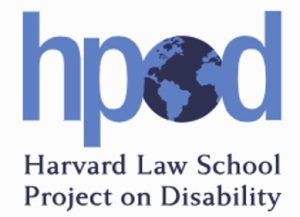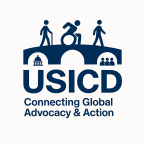The International Disability, Peace and Security Network (IDPS Network)
The International Disability, Peace and Security Network (IDPS Network), launched in 2023, is a growing coalition of organizations of persons with disabilities, civil society organizations, research institutes and individual advocates committed to ensuring that persons with disabilities are included in and accounted for in all aspects of the international peace and security agenda, consistent with Article 11 of the Convention on the Rights of Persons with Disabilities and UN Security Resolution 2475.
The founding organizations resourcing and undertaking research, education and legal advocacy in support of the Crimes against Humanity Advocacy Working Group (CAH Working Group) of the IDPS Network include the United States International Council on Disabilities and:


Center for International & Comparative Law

Contact us for more information on the IDPS Network and its CAH Working Group,
About the Crimes Against Humanity Convention
Crimes against humanity, along with genocide, war crimes and the crime of aggression, are recognized as among the most heinous international crimes. These crimes fall heavily on the world’s population of persons with disabilities who are at risk of violence generally as a consequence of persistent inequalities and specifically during times of crisis when heinous crimes occur.
Crimes against humanity, which can be perpetrated in times of armed conflict and in times of peace, are not specifically regulated by treaty in a way that can address the prevention of such crimes in the first place, and the punishment of such crimes when they do occur.
In 2013, the United Nations International Law Commission moved to place crimes against humanity in its programme of work and make it the focus of extensive study. In 2019, the Commission, following its years of study, recommended the development of a convention on crimes against humanity by the UN General Assembly or by an international conference. The ILC also produced draft text for a treaty on the topic.
The International Law Commission’s Draft Articles for a convention were submitted to the UN. In 2022, the UN General Assembly’ Sixth Committee adopted resolution 77/249 to initiate further work for developing a potential treaty on crimes against humanity. Two interactive sessions were held in New York in 2023 and again in 2024 to discuss in detail the ILC’s Draft Articles and to consider the elaboration of a treaty.
The International Disability Peace and Security Network and its Working Group on Crimes against Humanity has engaged in numerous convenings around the treaty, in close coalition with the broader civil society coalition.
Policy Briefs and Other Related Documents
- January 2026 – Joint Statement – Global: States should enable broad civil society participation in the negotiations on The Convention on Crimes Against Humanity, and ensure the rights of persons with disabilities (Endorsed by USICD)
- January 2026 – Advancing Gender Justice in the Crimes Against Humanity Convention: A Declaration. (Endorsed by USICD)
- July 2025 – Policy Brief: Drafting a Disability Cognizant Convention on Crimes against Humanity: Recommendations for Accounting for Persons with Disabilities
- July 2025 – Disability: A Missing Piece of the International Criminal Law Puzzle, Harvard Law School Project on Disability presentation.
For more details, see: The U.N. Process for a Crimes Against Humanity Treaty Has Finally Started. Will It Account for Persons with Disabilities?
Become a member of USICD to receive updates on the Crimes Against Humanity Treaty. International members welcome!
